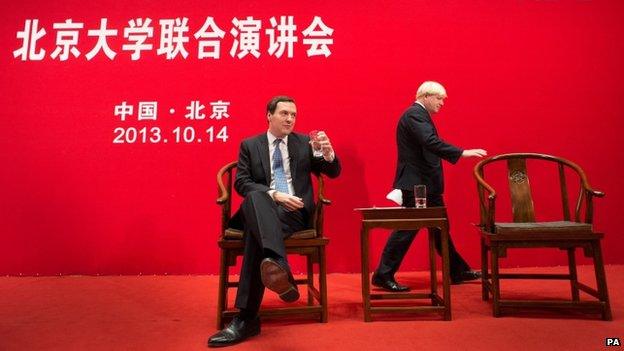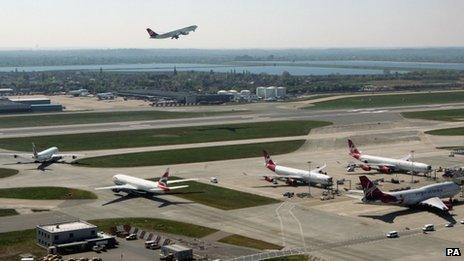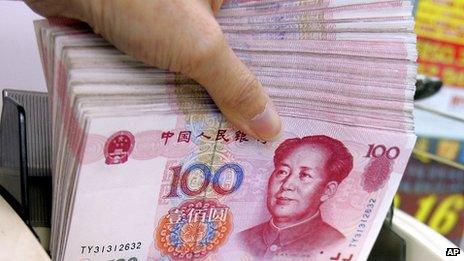Changed balance of power in Anglo-Chinese history
- Published

Chancellor George Osborne and London Mayor Boris Johnson are both in China
The Chinese love their history at least as much as the British, and it will not be lost on either hosts or guests this week that George Osborne's trade and investment mission to China is travelling a well trodden path.
It was the UK that in the 18th and 19th Centuries led Western attempts to make China open its economy to the world.
The Chinese side will remember that it was Lord George Macartney who led the first British trade mission to China in 1793.
The objective then was to persuade the mighty Chinese empire to allow more freedom to British traders.
At that point "the empire on which the sun never sets" and the self-styled "Middle Kingdom" had competing and incompatible world views. More than 200 years on, much has changed. But the worldview is still at issue.
Beset by a conflict of interests, cultural misunderstandings and Lord Macartney's famous refusal to kowtow before the Chinese emperor, his mission was unsuccessful.
He said: "The empire of China is an old, crazy, first-rate man of war, which a fortunate succession of vigilant officers have contrived to keep afloat for these 150 years past, and to overawe their neighbours merely by her bulk and appearance.
"But whenever an insufficient man happens to have the command on deck, adieu to the discipline and safety of the ship. She may, perhaps, not sink outright; she may drift some time as a wreck, and will then be dashed to pieces on the shore - but she can never be rebuilt on the old bottom."

China is increasing its investment in UK infrastructure
This no doubt makes interesting reading for the current ship's commander, China's President Xi Jinping.
Along with many other Chinese, he would probably concede that Lord Macartney's comments were prophetic and insightful given the century and a half of humiliation that followed that ill-fated mission, a century in which China saw foreign invasion, defeat by the British in the Opium Wars, civil war, economic disaster and Maoist frenzy.
'No use'
But, and here's where Xi Jinping might allow himself a wry smile at the ironies of history, now China boasts one of the largest sovereign wealth funds in the world, and another British mission is in Beijing with a very different message.
Chancellor George Osborne has said: "The Chinese economy is changing, Those who think it is just a low-wage, low-tech economy are making a mistake. It is becoming a cutting-edge player in industries like technology and this is a huge opportunity for Britain."
Already China has bought big stakes in key assets such as Heathrow Airport and Thames Water. Now its companies, many of them state owned, are investing in construction, nuclear energy, renewable energy, telecoms and property.
This is absolutely new. For two centuries, the economic relationship between the UK and China has been all about trade. At first the British wanted Chinese tea, silks and porcelain, and could offer nothing the Chinese wanted in return.
Chancellor George Osborne: "Over my lifetime it's (the Chinese currency) is going to become almost as familiar as the dollar"
After the Macartney mission, the emperor Qianlong wrote to George III: "As your ambassador can see for himself, we possess all things. I set no value on objects strange or ingenious, and have no use for your country's manufactures."
Hence the British recourse to selling opium, which, to cut a long story short, led to two wars and the forced opening of the Chinese economy.
Balance of power
In the 1950s China's door was slammed shut again by Chairman Mao and it wasn't until the late 1970s and early 1980s that the entrance creaked open again under Deng Xiaoping.
The Chinese soon realised how desperately short of cash and knowhow they were. Britain could offer both, and had the advantage of easy access and good contacts through its colony in Hong Kong.
But 30 years on, the balance of power has shifted again. British exports to China have struggled to keep pace with its growing hunger for imports of Chinese clothing, toys, laptops and mobile phones.
The trade deficit with China is now £20bn a year, partly because Britain's strength is in services, while China's demand is for raw materials and machine tools.

China has billions of yuan with which to invest overseas
China's trade surplus now contributes to a mighty $400bn sovereign wealth fund. And as George Osborne tries to kick-start British economic growth, the UK is competing for sovereign funds and private capital to finance investment. As a result, inward Chinese investment to the UK in the past 18 months has been greater than in the past 30 years combined.
"We could say the UK is the most open market worldwide, especially in the infrastructure sector, and this means huge business for China," says Zhou Xiaoming, minister counsellor at the Chinese embassy in London.
But it's not just infrastructure projects that are looking for Chinese money.
'The UK is the land of thinkers," adds Mr Zhou. "Chinese manufacturers could learn a lot when they are here."
As George Osborne and Boris Johnson tour China this week, presiding over deals and offering toasts, what would the Qianlong emperor and Lord Macartney make of it all? The ironies of history would not be lost on them.
But perhaps they might warn that there are still two very different worldviews in play. For two countries with such long and proud histories, 1793 is like yesterday.
- Published14 October 2013
- Published14 October 2013
- Published13 October 2013
- Published13 October 2013